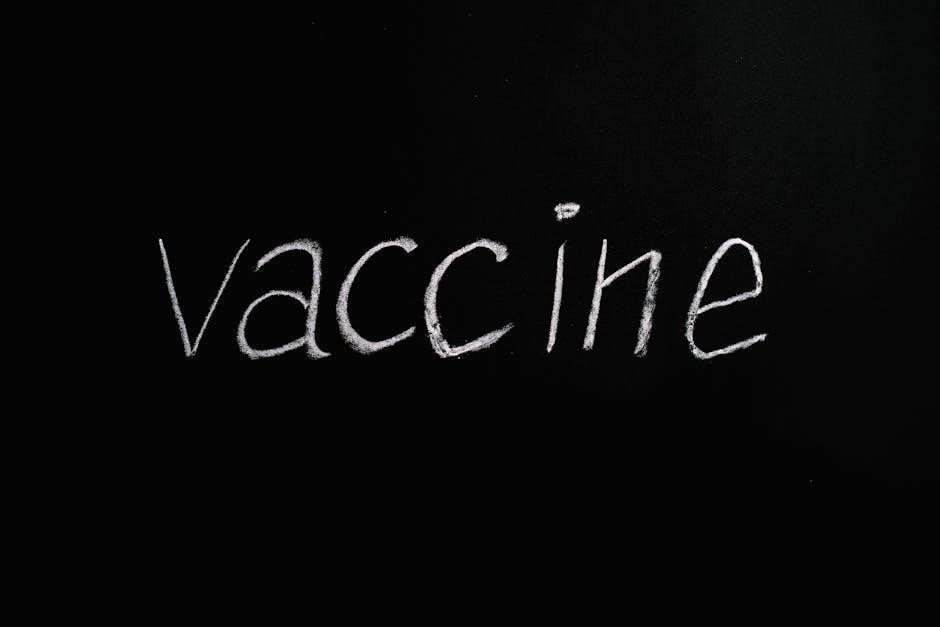
Overview of Flu Vaccine Exemption in New Jersey
New Jersey allows flu vaccine exemptions for medical or religious reasons, with specific forms like the Influenza Medical Exemption Form available for submission.
1.1 Importance of Flu Vaccine Exemption Letters
Flu vaccine exemption letters are crucial for individuals seeking to opt out of mandatory influenza vaccinations in New Jersey. They provide legal and medical documentation, ensuring compliance with state laws while respecting personal or religious beliefs. These letters protect students, employees, and employers by preventing potential conflicts and exclusions. They also safeguard public health by maintaining vaccination rates while accommodating legitimate exemptions. Drafting a clear, authentic exemption letter is essential to avoid disputes and ensure smooth processing by schools or workplaces. Proper authentication, such as a physician’s signature, adds credibility and ensures the exemption is taken seriously.
1.2 Legal and Medical Requirements in New Jersey
In New Jersey, flu vaccine exemptions must meet specific legal and medical criteria. Medical exemptions require a licensed physician’s certification, stating the vaccine poses a health risk. Religious exemptions must demonstrate a sincere religious belief opposing vaccination, often requiring a letter from a religious leader. Personal belief exemptions are not recognized in New Jersey. The state mandates strict adherence to these requirements to ensure public health safety while respecting individual rights. Proper documentation, such as the Influenza Medical Exemption Form, must be submitted to schools or employers. The New Jersey Department of Health enforces these regulations to balance exemptions with community protection.
Types of Exemptions for Flu Vaccines
New Jersey recognizes medical and religious exemptions for flu vaccines. Medical exemptions require a physician’s certification, while religious exemptions must reflect sincere religious beliefs opposing vaccination.
2.1 Medical Exemptions
Medical exemptions for flu vaccines in New Jersey require certification from a licensed physician. These exemptions are granted when vaccination is contraindicated due to medical conditions, such as severe allergies or immune disorders. The physician must provide detailed documentation, specifying the medical reason for the exemption. New Jersey’s health department offers specific forms, like the Influenza Medical Exemption Form, which must be completed and submitted annually. This process ensures that individuals with legitimate medical concerns are protected while maintaining public health standards. The exemption must be renewed each flu season to remain valid.
2.2 Religious Exemptions
In New Jersey, religious exemptions for flu vaccines require a formal request based on sincerely held religious beliefs opposing vaccination. Individuals must belong to a recognized religion with teachings against vaccines. A notarized letter detailing the religious objection is typically required. The exemption process involves submitting this letter to the relevant authority, such as schools or employers. New Jersey accepts religious exemptions under specific guidelines, ensuring the request is genuine and aligned with religious doctrine. Forms like the MMR/Varicella/Tdap Exemption Form may be adapted for flu vaccine exemptions, though specific religious exemption forms are also available.
2.3 Philosophical or Personal Belief Exemptions
New Jersey does not typically recognize philosophical or personal belief exemptions for flu vaccines, unlike some other states. The state primarily allows exemptions for medical or religious reasons. However, some individuals may attempt to draft exemption letters based on personal objections, though these are generally not accepted. Schools and workplaces often require compliance with flu vaccination mandates unless a valid medical or religious exemption is provided. As a result, philosophical exemptions remain limited in New Jersey, emphasizing the importance of adhering to established medical and religious criteria for exemption requests.
Process of Obtaining a Flu Vaccine Exemption in NJ
Obtaining a flu vaccine exemption in New Jersey involves reviewing requirements, preparing necessary documents, and submitting them to schools or employers for approval.
3.1 Consulting with Healthcare Providers
Consulting with healthcare providers is a critical step in obtaining a flu vaccine exemption. Physicians assess medical eligibility, discuss risks, and verify conditions for exemptions. Parents must engage in open dialogue with providers to address concerns. Healthcare providers are not obligated to refuse care based on vaccination status but must ensure medical reasons for exemptions are valid. This consultation ensures compliance with legal and medical standards, providing a foundation for drafting exemption letters. Clear communication helps align parental requests with professional guidance, facilitating a smooth process for both parties. This step is essential for meeting exemption criteria effectively.
3.2 Drafting a Religious Exemption Letter
Drafting a religious exemption letter requires careful articulation of sincerely held beliefs opposing vaccination. The letter should specify how religious teachings conflict with flu vaccination, ensuring clarity and sincerity. It’s important to reference specific religious doctrines or principles that prohibit immunization. Parents may also request confidentiality to protect their personal beliefs from unnecessary scrutiny. The letter should be respectful, clear, and concise, avoiding vague statements. Religious leaders or organizations may provide support or validation of the beliefs expressed. Ensuring the letter aligns with New Jersey’s legal standards is crucial for acceptance, making it a vital step in the exemption process.
3.3 Submitting the Exemption Request
Submitting a flu vaccine exemption request in New Jersey involves completing the appropriate forms, such as the Influenza Medical Exemption Form or religious exemption documents. Parents or individuals must ensure all sections are filled accurately, including personal information and exemption reasons. The completed form, often requiring a healthcare provider’s signature, should be submitted to the relevant authority, such as schools or employers. Deadlines, like December 31 for flu vaccine requirements, must be met to avoid exclusion. The submission process may also include attaching supporting documentation, such as letters from religious leaders. Timely and proper submission ensures compliance with state regulations.

Required Elements of a Flu Vaccine Exemption Letter
A flu vaccine exemption letter must include personal and contact information, a clear statement of the exemption reason, and a signature from an authorized healthcare provider or religious leader.
4.1 Personal and Contact Information
A flu vaccine exemption letter must include the individual’s full name, address, and contact information. This ensures the request is properly identified and verified. Additionally, the letter should specify the name and details of the organization or institution requiring the exemption, such as a school or employer. Including a valid mailing address and phone number allows authorities to contact the applicant if further clarification is needed. This section is crucial for maintaining accountability and ensuring the exemption process is transparent and legitimate. Accurate personal and contact information helps prevent delays in processing the request.
4.2 Statement of Exemption Reason
The exemption letter must clearly state the reason for requesting exemption, whether medical or religious. For medical exemptions, the letter should detail the specific health condition that prevents vaccination, supported by a healthcare provider’s confirmation. Religious exemptions require a sincere statement outlining how the vaccination conflicts with deeply held religious beliefs. The statement must be detailed enough to demonstrate a genuine and longstanding conviction. It should avoid vague claims and instead provide specific religious teachings or principles that prohibit vaccination. This section ensures the exemption request is based on valid, documented reasons and aligns with New Jersey’s legal standards for such exemptions.
4.3 Signature and Authentication
The exemption letter must be signed by the individual or their legal representative to confirm its validity. For medical exemptions, a licensed healthcare provider’s signature is required to authenticate the medical reasoning. Religious exemptions typically require the individual’s personal signature, affirming their sincerity. Some cases may need notarization or witness signatures for additional verification. The signature ensures accountability and legitimacy, making the exemption request formally recognized under New Jersey’s guidelines. Proper authentication is crucial to avoid disputes and ensure compliance with state regulations for flu vaccine exemptions.

Where to Find Flu Vaccine Exemption Forms in NJ
Flu vaccine exemption forms are available on the New Jersey Health Department website, school offices, and workplace HR departments. Specific forms like the Influenza Medical Exemption Form can be downloaded as PDFs for submission.
5.1 Official New Jersey Health Department Resources
The New Jersey Department of Health provides official resources for flu vaccine exemption forms. These include downloadable PDFs such as the Influenza Medical Exemption Form and the MMR/Varicella/Tdap Exemption Form. The Department’s Vaccine Preventable Disease Program offers guidance on obtaining medical exemptions. Additionally, the NJ Health Department website features detailed instructions for submitting exemption requests. Parents and individuals can access these forms directly from the official state health portal. These resources ensure compliance with state regulations and simplify the exemption process for those seeking medical or religious accommodations.
5.2 School and Workplace Forms
Schools and workplaces in New Jersey often provide specific forms for flu vaccine exemptions, which can be accessed through their administrative offices or websites. For example, schools may offer exemption forms tailored to their policies, while workplaces might include exemption requests in employee health documentation. These forms typically align with state health department guidelines and must be completed accurately to ensure compliance. Religious or medical exemption letters, such as the Influenza Medical Exemption Form, are often required to be submitted alongside these documents. Employees and students must adhere to submission deadlines to avoid exclusion or other consequences.

Addressing Vaccine Hesitancy in Parents
Addressing vaccine hesitancy involves understanding concerns and educating parents about flu vaccine safety and benefits, as highlighted in studies assessing parental perceptions and knowledge.
6.1 Understanding Concerns About Vaccines
Addressing vaccine hesitancy requires understanding parental concerns, such as fears about safety, side effects, and efficacy. Studies show many parents question vaccine necessity due to perceived low flu risk. Religious or philosophical beliefs also play a role, with some viewing vaccines as conflicting with personal values. Open dialogue with healthcare providers can help alleviate fears by providing evidence-based information. Surveys highlight the need to assess these concerns accurately to tailor educational strategies, ensuring parents feel heard while being informed about vaccine benefits and risks.
6.2 Role of Healthcare Providers in Education
Healthcare providers play a crucial role in educating parents about flu vaccines, addressing concerns, and dispelling myths. They should provide evidence-based information on vaccine safety and efficacy. Open dialogue helps build trust, allowing parents to express fears and misconceptions. Providers can share personalized risks and benefits, tailoring discussions to individual circumstances. Educational efforts should emphasize the importance of vaccines in preventing flu-related complications. By fostering informed decision-making, healthcare providers can reduce vaccine hesitancy and encourage immunization. Their support is vital in helping parents make confident, well-informed choices for their families.

Consequences of Not Meeting Flu Vaccine Requirements
Failure to comply with flu vaccine requirements in New Jersey may result in exclusion from school or workplace until the flu season ends or vaccination is completed.
7.1 Exclusion from School or Workplace
Individuals who fail to meet flu vaccine requirements in New Jersey may face exclusion from school or workplace. This policy ensures compliance with public health measures. Schools and employers typically enforce this rule to minimize flu transmission risks. Those without a valid exemption or vaccination may be barred from attending classes or working until they comply or the flu season ends. This exclusion is a direct consequence of not fulfilling the mandated health requirements, aiming to protect community health and safety. Authorities strictly enforce this to maintain a safe environment and prevent outbreaks.
7.2 Impact on Public Health
Flu vaccine exemptions can reduce community immunity, increasing the risk of flu outbreaks. When fewer individuals are vaccinated, the virus spreads more easily, endangering vulnerable populations like the elderly and those with compromised immune systems. This can lead to increased hospitalizations and strain on healthcare systems. Public health efforts to control influenza are undermined when vaccination rates drop, highlighting the importance of collective immunity. The impact extends beyond individuals, affecting community safety and disease transmission dynamics. Balancing personal exemptions with public health needs remains a critical challenge for policymakers and healthcare providers.




